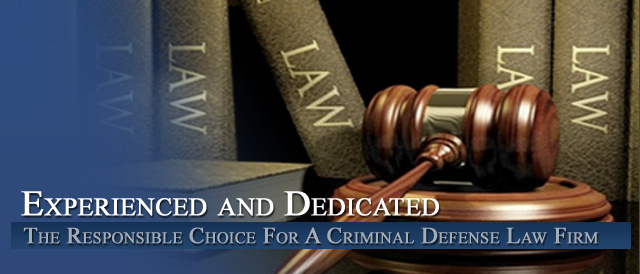




If You Are Charged with a Federal Crime
If you’re currently involved in or are a target of a state or federal criminal investigation, you may have already asked yourself some of these same questions.
With a criminal justice system that seems to favor the prosecution, will a good criminal defense attorney really make a difference?
Now more then ever before is this so true. With the recent advent of literally hundreds of new state and federal criminal codes and, in some cases, the adoption of the mandatory minimum sentencing guidelines, which can cause jail and prison sentences to be unfairly high, it is vital for any defendant facing criminal prosecution to secure an extremely reputable and proficient attorney.
Strategy, being detailed and execution are the keys to a successful defense. An experienced attorney who understands this can save clients from years of prison. I have been a criminal attorney for 16 years. I truly enjoy the implementation of a well-thought out case strategy. It’s like playing chess. You must think many “moves” in advance of your opponent.
It’s my first offense, I’ll probably get probation, right?
Actually, your first offense has little to do with it. Basically, in the federal system, the government will go to a book called the United States Sentencing Guidelines Manual to determine your fate. The appropriate table pertaining to your case will be turned to, next the row and column that matches the quantitative value and number of convictions will be selected, and for the most part, your sentencing range will have been determined.
It does not matter whether you have children and both parents may be facing prison sentences. If there are no relatives to care for the children, the children could be placed in foster care through a governmental agency. It doesn’t matter if you’re pregnant, and it doesn’t matter if you’re 70 years old. If the United States Sentencing Guidelines Manual states that you should go to prison, unless there is some type of legal maneuver or downward departure from sentencing, presented and orchestrated on the part of your attorney, you will go to prison. This is where a good attorney can make all the difference in world.
How do you know when the government is coming to arrest you?
Many times you don’t, and this is why you may want to retain a good attorney early on. Usually when prosecutors are ready to make arrests, they send sheriffs or marshals along with investigative agents, bright and early, to the residences or places of employment.
A favorite ploy of the government is to attempt to arrest you on a Thursday or Friday so that you will at least spend the weekend in jail, or a detention center [a 90’s term for jail], before you can be released on bail. If you catch a problem early enough, there is a good probability that, if you have retained a good attorney, this situation can be avoided.
How long does it usually take prosecutors to make arrests after a federal crime has been committed?
Well, this varies. Prosecutors may wait until the criminal activity reaches a certain volume, especially in white collar crime. It is not unusual for criminal suspects to be under investigation for several years before they are even aware it. A time line from the investigative discovery to charges or indictment can be a number years. You see, the higher the dollar or quantitative volume, the bigger the case and the more “points” scored by both investigators and prosecutors, as well as more prison time dispensed to convicted defendants.
I haven’t heard anything in a while, do you think they forgot about it or closed the case?
Unlikely. The government is a huge machine that just keeps churning away. If a criminal investigation was opened, then it is either usually in process or on hold. You can pretty much bet that every case being investigated is sitting in a computer that highlights any investigation that moves too close to the statute of limitations date. It is not unusual for the government to sit on an investigation for years only to surface it when the time is more appropriate for them.
What are the chances for a “not guilty” verdict if a federally charged criminal defendant takes the case to trial?
Statistically not very good. Currently federal prosecutors tout above a 95-percent conviction rate. This is primarily because most cases never make it to trial. Most defendants end up taking a plea bargain rather then risk a potentially much greater prison sentence that could be dealt them if they actual went to trial and lost. Another factor is the empowerment and impunity given to both investigating authorities and prosecutors, along with an interesting trial maneuver called “jury instructions,” which are basically parameters that the judge provides the jury that can greatly affect the outcome of a verdict.
Lets say you are charged with a federal crime that could send you to prison for 10 years if you lose at trial, and you are being offered a 3-year prison sentence if you accept a plea bargain. If you believed you were innocent, would you still take your case to trial knowing that if by chance you lose, you may have to serve a 10-year prison sentence? Currently within the federal prison system, you will serve at least 85 percent of that time.
What about the innocent person who’s indicted–won’t a trial bring out the truth?
Ideally that’s how it should be but unfortunately, at least in the federal court system, it many times does not go this way. Its almost always the goal of the prosecutor to get the defendant to take a plea bargain. Why? Because it saves the prosecutor time, and it save the government money.
The prosecutorial system is actually engineered to motivate a criminal defendant into taking a plea bargain by offering points off for cooperating. It is well known that a criminal defendant, who chooses to take the case to trial, risks receiving a much stiffer prison sentence as opposed to taking a plea bargain. It gets easier to see why the prosecutors are beating Vegas odds with a 95-percent-plus federal conviction rate.
What’s the difference between prosecutors and investigators?
Investigators include the FBI, DEA, Secret Service, and any other organization that has been empowered to investigate federal-related criminal activities. Prosecutors are usually assistant U.S. attorneys who actually conduct the plea bargaining and courtroom trials. It is not unusual for U.S. attorneys to work with a variety of investigative branches during their tenure as a prosecutor.
Is justice the primary motive of investigators and prosecutors?
Justice is a primary credo among investigators and prosecutors as an overall convention; nevertheless, there are also personal and professional objectives to consider. Every conviction, every arrest, as well the total dollar or quantitative amounts involved are points that help move investigators and prosecutors up the career ladder. Their positions are very subjective in that they are empowered with such discretion and impunity within the federal prosecutorial system. For example, it is usually up to the prosecutor to decide who will be prosecuted and who will not within a multi-defendant investigation. So while multiple individuals may have participated in a federal crime, some may be charged while others may not–the selection can be based on a personal tactical strategy, or esoteric reasons such as personality conflicts.
Isn’t it difficult for prosecutors to get an indictment against an person?
What people don’t realize is that federal prosecutors can get an indictment at the drop of a hat. Usually its a closed hearing, and most of the time the person or persons targeted have no idea this is happening. The next thing you know you’re fighting for your life.
Summary
Reading the questions and answers above can be a little unsettling, but we wanted you to know about some of the implicit realities that face many people today. We want you to know that we understand that butterfly feeling in your stomach when the government may be leaning your way. We’re here to help. We’ve been in the business a long time, we know the intricacies.
Getting sentenced to jail for a federal crime case depends on the statute of conviction and the federal crime sentencing guidelines, which are very strict. The federal crime case judge is required to rely on a sentencing table that has been established by the commission. Every different type of federal crime is assigned a point value that can be adjusted, depending on the characteristics of the federal crime offense.
If you are currently under investigation for a federal crime, contact us to speak with an expert federal crime offense attorney.
H. Michael Steinberg
Other Articles of Interest:
- Colorado Federal Criminal Cases
- Great Research Links
- United States Law Links
- Some Great Legal Research Sources
- Fraud Crimes












